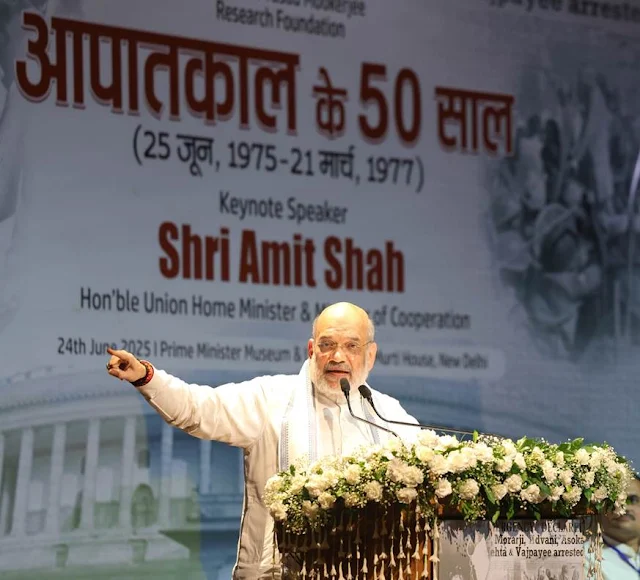As India marks the 50th anniversary of the Emergency declared by Indira Gandhi in 1975, it is important to look beyond the official commemorations and media narratives. The period of suspended civil liberties, mass arrests, and media censorship has rightly been condemned across the political spectrum. Yet, the attempt by the BJP and RSS to project themselves as the principal voices of resistance during those 21 months raises critical questions about historical accuracy and political appropriation.
The Union Cabinet’s recent resolution denouncing the Emergency claims to honour the sacrifices of those who fought against it and even attributes the “subversion of the Constitution” to events predating 1975, such as the Navnirman Andolan and the Sampoorna Kranti movement. While these statements may resonate with public memory, they also reflect a calculated narrative—one that conveniently elevates the RSS’s role far beyond what historical records support.
Journalistic and scholarly accounts tell a different story. Veteran journalist Prabhash Joshi noted that Balasaheb Deoras, the then-chief of the RSS, wrote to Indira Gandhi offering support for Sanjay Gandhi’s infamous 20-point program. According to Joshi, many from the RSS and Jan Sangh not only distanced themselves from the JP movement once arrested but also wrote apology letters, or mafinamas, to secure their release. "They are not a fighting force… they are basically a compromising lot," Joshi observed, questioning the moral authority of those now claiming credit for resistance.
TV Rajeswar, former Intelligence Bureau chief and Governor of Uttar Pradesh and Sikkim, corroborates this in his book India: The Crucial Years. He documents how the RSS sought to maintain contact not just with Indira Gandhi but also with Sanjay Gandhi during the Emergency, highlighting their efforts to ingratiate themselves with the regime rather than oppose it.
BJP leader Subramanian Swamy has also acknowledged that both Deoras and Atal Bihari Vajpayee wrote apology letters to Indira Gandhi, dissociating from the opposition movement. According to him, Maharashtra Assembly records confirm that Deoras disowned the JP-led agitation in letters from Yerawada Jail and offered to support the government's 20-point agenda.
These are not isolated claims. Dr. Suresh Khairnar, former president of the Rashtra Seva Dal and a fellow Emergency-era detainee, witnessed RSS members signing mafinamas in prison. When confronted, they reportedly defended their actions by invoking the example of V.D. Savarkar—who himself had sought clemency from British rulers during the freedom struggle. This ideological thread of calculated compromise seems to run deep in the organization’s history.
One cannot forget another revealing moment from the pre-Emergency era. In 1942, during the Quit India movement, Atal Bihari Vajpayee was arrested in Bateshwar near Agra for participating in a satyagraha. He was released shortly after disassociating himself from the movement. Such episodes challenge the portrayal of the RSS and its affiliates as stalwart defenders of democracy and constitutional values.
During Vajpayee’s tenure as Prime Minister in 1998, many human rights activists began to perceive that the BJP was not just another political formation but a party driven by a fundamentally different ideological vision. This became even clearer after Narendra Modi assumed power in 2014 and then consolidated it with a stronger mandate in 2019.
Today, India faces a different kind of Emergency—one that is undeclared but deeply felt. Lal Krishna Advani himself admitted in 2015, “An undeclared Emergency has been going on in India.” Over the past decade, we have seen the muzzling of free speech, the imprisonment of dissenters, and the erosion of judicial independence. Activists have been jailed under draconian laws, media has largely been tamed, and minorities are targeted under pretexts like “love jihad” and beef consumption.
Despite this, the RSS-BJP ecosystem continues to appropriate the legacy of the Emergency resistance while ignoring the authoritarian drift in its own governance. Their silence and complicity in the face of declining democratic norms speak volumes.
If the 1975 Emergency was a black chapter in India’s democratic journey, the current moment demands no less scrutiny. India needs to reflect not just on the past but on the present erosion of constitutional values. True homage to the spirit of democratic resistance would be to challenge the creeping authoritarianism of today—whether declared or not.
---


Comments